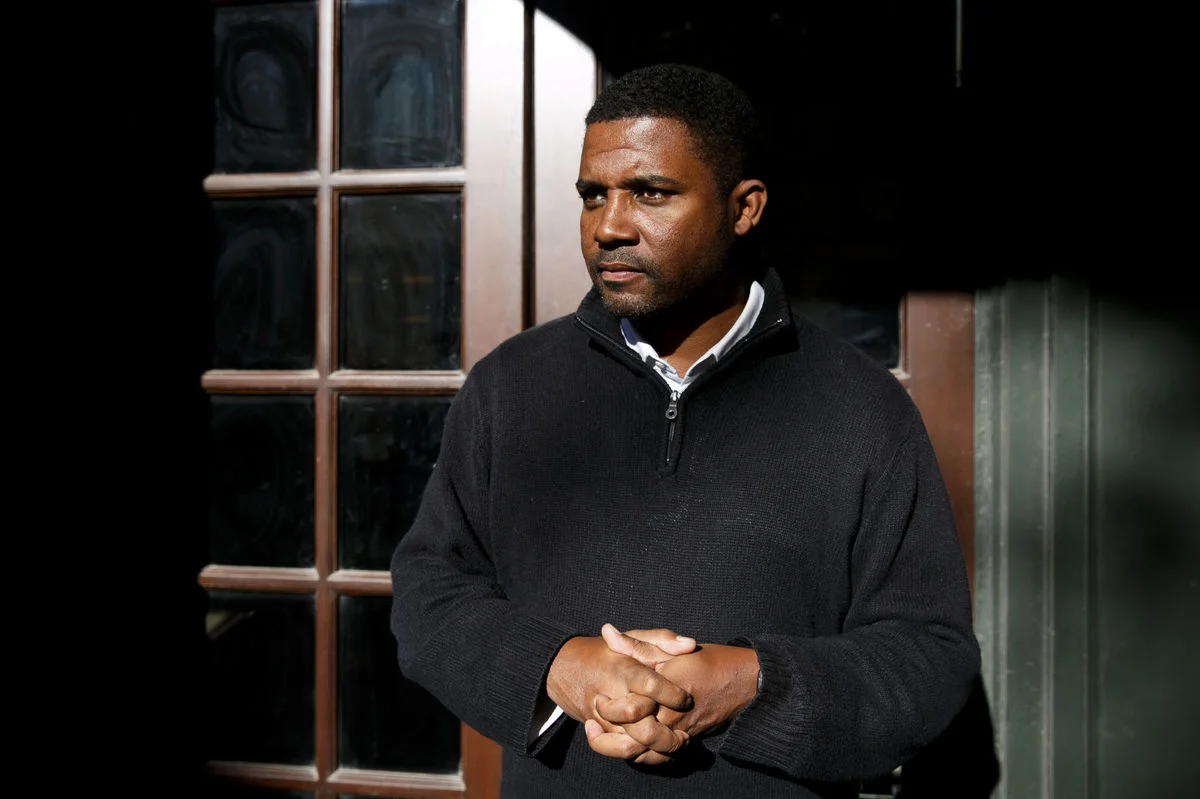"The Parchman Hour" at the Wells Theatre relives pain and triumph of Freedom Riders
The Virginian-Pilot
October 27, 2017
Rashad Ollison
Mike Wiley, writer of "The Parchman Hour," is photographed at the Wells Theatre in Norfolk, Va., on Tuesday, October 17, 2017. (Kristen Zeis | The Virginian-Pilot)
The violence isn’t real. But that wasn’t the case 50 years ago, when a fist to the face and near-fatal choke holds were part of everyday life at Parchman Farm, the notorious Mississippi prison.
Theater students from Norfolk State University work on fight scenes during a rehearsal for “The Parchman Hour” at the Wells Theatre in downtown Norfolk. A man runs onto the stage and pretends to kick another in the ribs. Later, an actor practices over and over again the precise way he’s supposed to fall after being choked and pushed.
“The Parchman Hour: Songs and Stories of the ’61 Freedom Riders,” a play by Mike Wiley that runs at the Wells through Nov. 12, centers on the story of the Freedom Riders in the 1960s. It’s the second collaboration between the Virginia Stage Company and Norfolk State University Theatre Company, following “The Wiz” in April.
Wiley’s play explores the stories of Freedom Riders who were barely out of their teens, risking their lives to challenge segregation laws in the South. The farther they went on buses from the North, the deeper the danger became. Some were arrested and literally thrown into Parchman Farm, which Wiley dramatizes.
“That’s always the crux of taking on any one of those kinds of projects, always looking for an entry point into the story, because the stories are massive,” says Wiley, seated in the empty lobby of the Wells. “How do you find a way to tell the story in just two hours? How do you find that entry way?”
The idea for “The Parchman Hour” came when Wiley was a visiting professor in documentary studies at Duke University and the University of North Carolina at Chapel Hill between 2010 and 2014. In one of his classes, he and the students started research on the Freedom Riders, a story Wiley was interested in beyond a possible documentary. He had already written plays based on African American history, dramatizing figures like Emmett Till and Jackie Robinson.
“History books will tell us about the Freedom Riders, and history books will tell us what happened in those jail cells at Parchman Farm,” says the North Carolina native, who’s 45. “But when we actually have those individuals who lived it, and those interviews are out there, when we have them talk about their experiences, we see it from a number of different perspectives and we’re able to uncover the truth, as it were.”
In the research, Wiley came across the diary of Mimi Feingold Real, a Brooklyn native who in 1961 was a sophomore at Swarthmore College when she became involved in the Freedom Rides. She was arrested in Jackson, Miss., and spent nearly four months in Parchman. She wrote about a variety show the prisoners created to keep their spirits up.
“And that was my ding-ding-ding moment,” Wiley says, “my entry way into the play.”
Through music that includes spirituals, and songs by Bob Dylan, “The Parchman Hour” adapts actual accounts from Freedom Riders.
“I didn’t learn most of what I learned about the Freedom Riders before I took on the show,” Wiley says. “A good friend of mine turned out to be a Freedom Rider, and I had no idea. That’s one of the most interesting aspects of that experience. They believed in a cause and put their bodies on the line. Afterward, they didn’t see themselves as heroes, just people trying to do the right thing.”
Wiley says he sees a correlation between the protests of the Freedom Riders and today’s Black Lives Matter activists.
“The techniques, the motivations, even the chants that they say at these protests come directly out of the Freedom Rider movement, the civil rights movement,” Wiley says. “This play is a direct reflection of those current organizations and the need to show that there is a history of protest.”
The summer of 1985, before Wiley entered the seventh grade, he was inspired to pursue the stage. Casting for the film “The Color Purple,” based on Alice Walker’s novel published three years before, took place on the same North Carolina college campus where he attended a drama camp for kids. It was something an aunt, who was a professional actress, had persuaded him to do.
“I got to watch lines and lines of African American women wait to be seen by Steven Spielberg and his casting directors. And I thought, ‘This is an amazing career opportunity,’ ” Wiley says. “I was learning acting from African American directors and professionals. When I got home that summer, I set my mind on acting, even though there weren’t many opportunities in the arts for black boys in Roanoke.”
Wiley grew up in a family dominated by women. He never knew his father. His mother worked in factories, and his grandmother, who helped raise Wiley and his two brothers, had worked her way from a domestic to a school teacher. Wiley eventually earned a master of fine arts degree from the University of North Carolina at Chapel Hill and has spent much of his career teaching and acting. He lives outside of Chapel Hill with his wife and two sons.
On stage where NSU students rehearse Wiley’s play, an actor rubs his shoulder where the repeated choreographed tumbles have apparently started to make it sore. “The Parchman Hour” shows how the Freedom Riders protested and sang despite routine beatings and death threats – and lived to tell the story.


